[Video] China's Harbin pampering visitors to win tourism battle
Harbin has seen an explosion of tourists this Chinese New Year season, and it is pulling out all the stops to welcome them, sometimes to the chagrin of locals. However, can this wave of tourism be sustained, and improve Harbin's economy? Lianhe Zaobao correspondent Daryl Lim takes a trip to China's land of snow and ice.
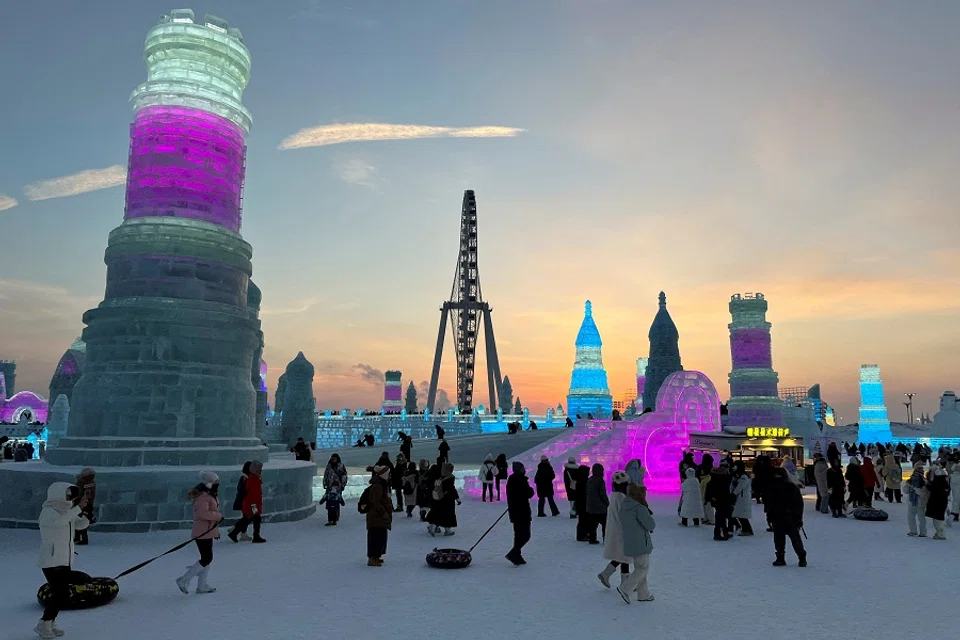
"I have never felt so confident climbing these steps in winter."
Walking along the underground passageway of Harbin's Central Street in the Heilongjiang province, you will often hear locals muttering to their companions as they point to the carpet beneath their feet, exasperated at the extent to which the local government pamper the tourists.
One of them is Miss Zhang, a 26-year-old who hails from Daqing in Heilongjiang but lives in Harbin.
She explained to Lianhe Zaobao that the stone slabs get very slippery during winter and people often slip and fall. However, this winter, in a bid to welcome foreign tourists, the local government made the unprecedented move to lay carpets on the steps, as they were worried that visitors might not be used to the conditions in the northeast region.
Zhang sighed: "The Harbin government is especially thoughtful towards tourists... Thanks to all of you, it is more convenient for us to get around too."
Post-Covid tourism boom
Harbin is the northernmost city in China. This city dubbed "China's land of ice and snow" has seen an unexpected boom in popularity this winter, with tourists from across China streaming in to enjoy its exotic atmosphere and the culture of snow and ice.
China's middle-class families - which have long suppressed their desire for snow and ice - badly need an outlet for their first post-pandemic winter.
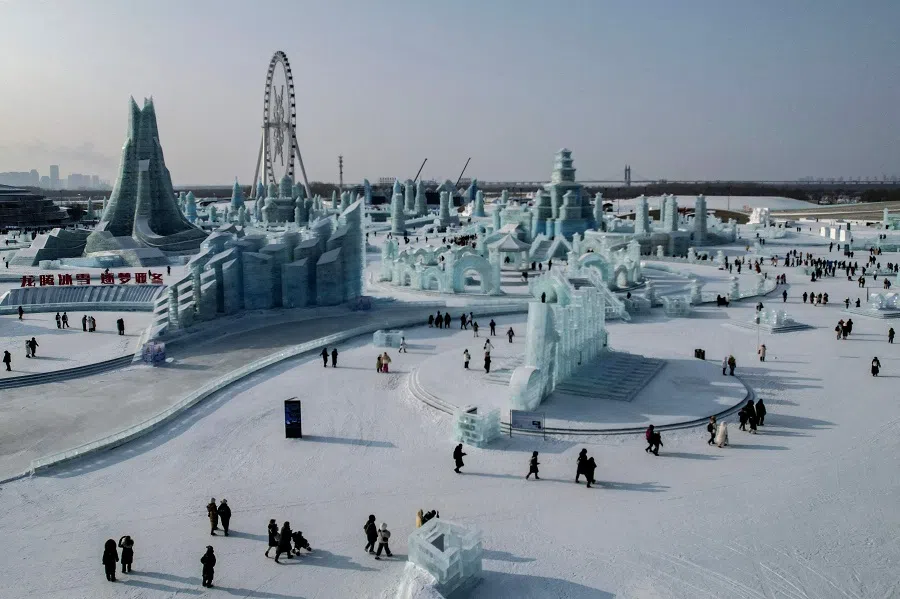
Official statistics show that over the three-day new year holiday, Harbin received more than 3 million tourists, with tourism revenue hitting a record high of nearly 6 billion RMB (US$833 million). Harbin's tourism revenue over the three days was even double that of Hainan province, which was also experiencing its peak tourist season.
Amid China's Spring Festival holidays, Harbin tourism has stayed red-hot. The Harbin Daily cited data from Ctrip which showed that on 10 February, the first day of Chinese New Year, the number of reservations for trips to Harbin grew by 244% year-on-year.
In mid-January this year, I visited two popular spots in Harbin: the famous commercial pedestrian street Central Street, and the Harbin Ice-Snow World. There were numerous tourists from southern China, mainly young college students and young families.
China's middle-class families - which have long suppressed their desire for snow and ice - badly need an outlet for their first post-pandemic winter. Large groups of tourists were eating ice cream at temperatures below -20 degrees Celsius, touching ice sculptures with their bare hands, enjoying a snowball fight and even partying in the snow.
Thousands of tourists queue for six hours in the cold, to go on a giant slide carved out of ice.
When interviewed, 31-year-old tourist Xie Xianhua from Guangzhou, Guangdong, said he decided to visit Harbin for the snow and ice experience when he saw that Harbin had gone viral online. He said: "The weather here is so different compared to the south. Us 'little potatoes from the south' have never seen so much snow or experienced such cold weather; all this is novel to us."
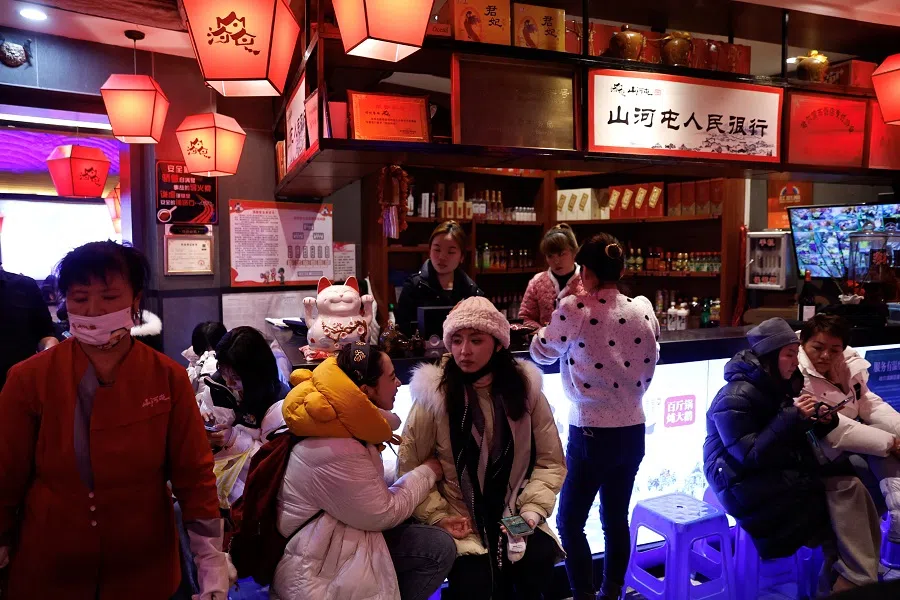
"Little potatoes from the south" is a nickname that Harbin locals use to refer to tourists from the south, describing how the smaller-sized southerners look in layers of thick down jackets.
Some locals unamused
Besides the unique experience of snow and ice, Harbin's warm hospitality towards tourists has been amplified by social media, attracting netizens from all over.
For example, local authorities set up heated huts to provide free phone charging service for tourists at some attractions, as Harbin's low temperature could easily sap mobile phone batteries; some businesses provided free ginger tea, heat packs, and even thermal soles for visitors; and some hawkers offered a sweet version of the northeastern savoury soybean curd to cater to the southerners' preference.
A meme featuring the term "R-bin"(尔滨) made the rounds online, saying that Harbin had "thrown in the kitchen sink" in a bid to welcome tourists, adopting various measures that were alien to the locals. As such, "Harbin" had become an unfamiliar "R-bin", and "Ha" was dropped because the locals were unamused and no longer able to heartily laugh "hahaha".
Winning tourists' hearts
Harbin's earnestness in wining over visitors was also shown during a ticket refund fiasco in mid-December last year. Due to the long queues at many of the popular attractions in the Harbin Ice-Snow World on its opening day, some visitors demanded refunds.
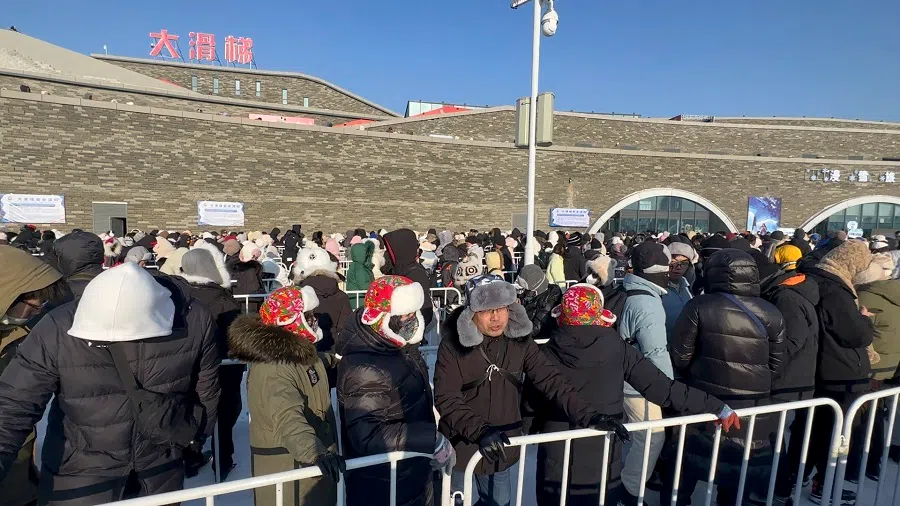
The organisers later refunded their tickets and even issued an apology, promising to reflect and rectify the situation immediately; leaders of the Harbin Culture and Tourism Bureau even personally supervised the situation, turning the crisis around and making Harbin into a tourist hot spot.
Li Kai, a professor at the School of Business Administration at Northeastern University and vice-president of the China Academy of Northeast Revitalization, said in an interview that what Harbin is doing highlights how the local government, businesses and residents are making quick adjustments in response to market demand, adapting to the rules of the market.
Once China's heavy-industry heartland, Harbin is known as the "eldest son of the PRC" and one of the key cities for development after the founding of the People's Republic of China (PRC), with its economic output ranking among the top ten cities in China for a long time before the 1980s.
Harbin's transformation
Following structural changes in the Chinese economy, however, the city's halo as an industrial base slowly faded. Unable to keep up with the pace of the country's economic reform, Harbin failed to attract enterprises and talents to develop emerging industries, leading to fewer employment opportunities and population loss. Its economy has been trapped in a harsh winter for over a decade.
Harbin has now transformed from a mere tourist destination to one that offers experiential travel at an affordable price, which is aligned with China's current tourism trend. - Professor Li Kai, School of Business Administration, Northeastern University
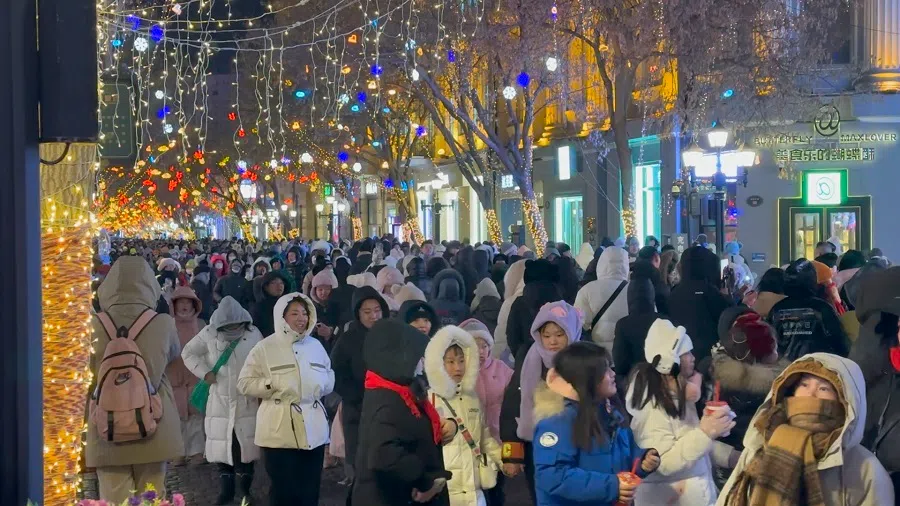
Latest statistics show that Heilongjiang's GDP amounted to 1.5884 trillion RMB in 2023. While it is up 2.6% from the previous year, it reported the slowest growth among China's 31 provinces, autonomous regions and municipalities. In 2022, Harbin's per capita GDP was around 55,540 RMB, the lowest among China's 27 provincial capitals.
Li thinks that the root of Harbin's problem lies in the structural contradictions in the transition from a planned to a market economy - northeastern Chinese are forthright and rough, and are often insensitive to market changes and tend to do as they please.
He said, "This is the main reason for Harbin's slow growth over the last two decades. Whenever there's a problem, everyone pushes the responsibility onto others instead of working to solve it."
In Li's view, Harbin has now transformed from a mere tourist destination to one that offers experiential travel at an affordable price, which is aligned with China's current tourism trend. He said, "Harbin has successfully seized the opportunity, leveraged its existing resource advantages, and its service-oriented government has been affirmed by the market."
Many people are concerned that Harbin may face the same fate as Zibo after the snow melts, and that its tourism boom is just a flash in the pan...
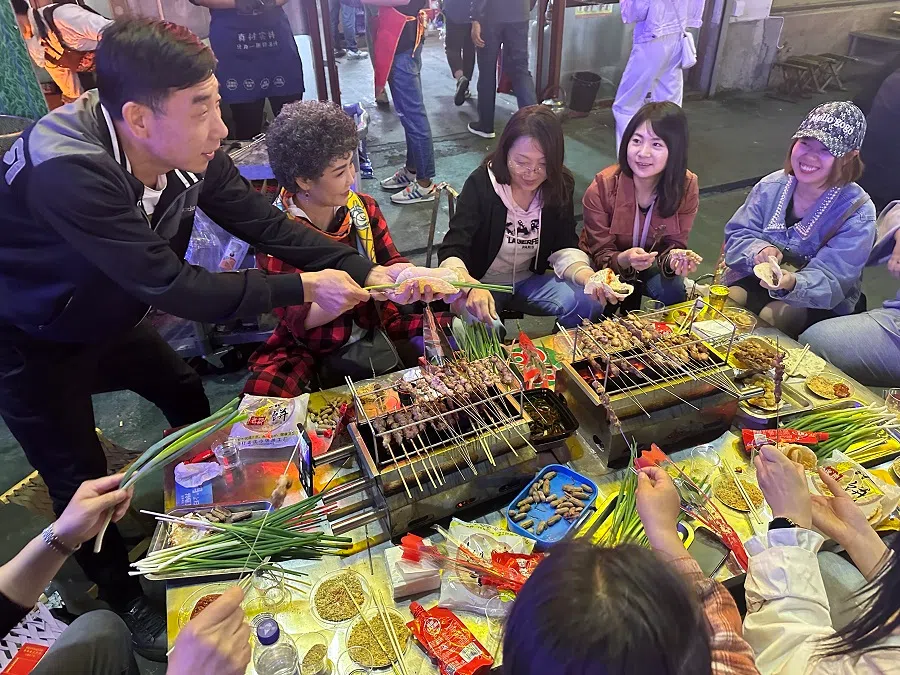
Through its passionate hospitality, Harbin has become one of the top "internet celebrity" cities in China, reminding many people of Shandong's Zibo, which also rose to fame last spring for the same reason, with its barbecue skewers.
Yet, Zibo failed to retain its tourist boom after the Labour Day holiday last year and saw its number of visitors plummet, while many barbecue restaurants were also forced to close after the craze died out. Many people are concerned that Harbin may face the same fate as Zibo after the snow melts, and that its tourism boom is just a flash in the pan that has no long-term effect on the local economy and industrial upgrading.
Sustainable trend?
Wang Chenguang, a professor at the School of Economics and head of the culture and tourism research centre of Shandong University, said in an interview that ice and snow are resources unique to Harbin. Against barbecue skewers that are relatively not unique, Harbin's winter tourism is a strength that is difficult to replicate.
As a provincial capital with a tourism base, Harbin is better able than Zibo to withstand the surge of tourists and turn it into a stable economic source.
"... Harbin must continue to develop its experiential tourism scene and bolster its service economy to overcome seasonal limitations and create a long-term pillar of the economy." - Professor Wang Chenguang, School of Economics, Shandong University
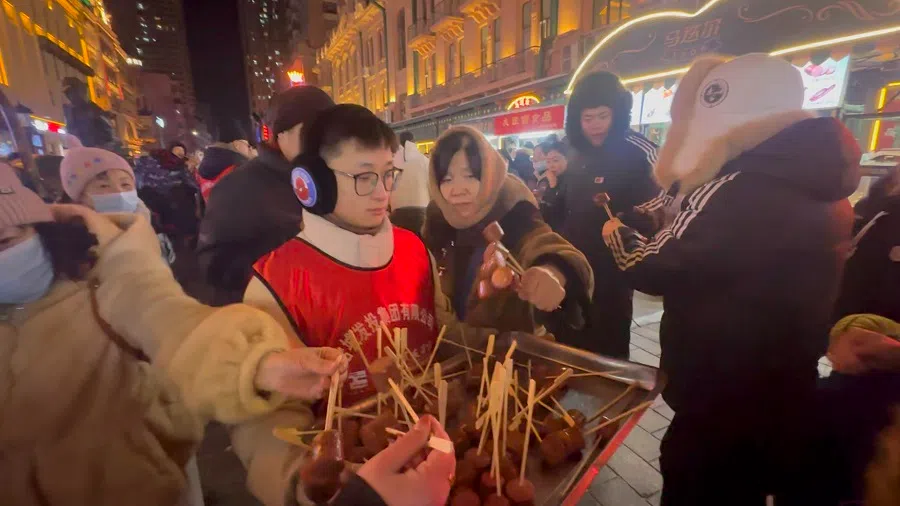
Wang thinks that Harbin's ice and snow economy can propel the service sector and promote sustainable tourism development through industrial upgrading.
He said, "The logic behind tourism is not the specific product or phenomenon, but the support system of the sector. Harbin must continue to develop its experiential tourism scene and bolster its service economy to overcome seasonal limitations and create a long-term pillar of the economy."
Despite the surge in the number of visitors to Harbin, several local travel agencies lamented when interviewed that this surge is limited to downtown Harbin - it has not pulled up tourism in surrounding areas, nor are travel agencies performing significantly better.
Zhao Chunling, a reception manager with Hongshun International Travel Agency in Heilongjiang, said in an interview, "Visitors may not be spending enough time in Harbin. Travel agencies generally made business from long-distance tours as tourists can easily visit the city's attractions on their own."
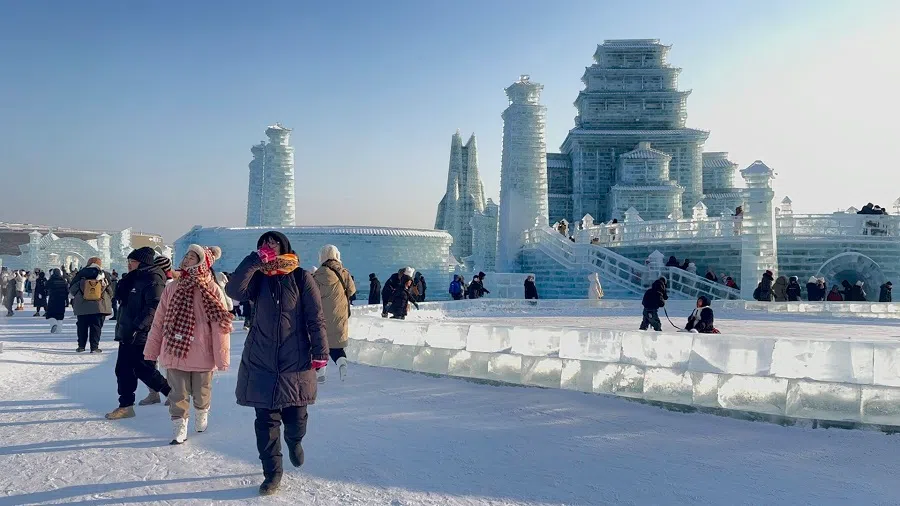
Wang assessed that based on the tourism boom in Zibo and Harbin, young consumers who focus more on travel experiences and a sense of engagement have replaced middle-aged people as the main force in China's tourism market.
He said that traditional sightseeing tours no longer appeal to them, and various regions must find breakthroughs in their existing tourism resources to meet demand.
Following Harbin's rise to fame, the culture and tourism departments across China are scrambling to follow suit, trying to attract attention online through headline events.
Looking at what is being done, "pampering tourists" seems to be the norm in the tourism strategies of several cities.
Wang stressed that tourism marketing cannot just depend on the "internet celebrity effect", but should also respond to tourists' needs and adapt to market patterns to be effective.
This article was first published in Lianhe Zaobao as "哈尔滨花式"宠客"旅游爆红 专家:冰城对市场经济规律变得更敏锐".




![[Big read] When the Arctic opens, what happens to Singapore?](https://cassette.sphdigital.com.sg/image/thinkchina/da65edebca34645c711c55e83e9877109b3c53847ebb1305573974651df1d13a)
